“Being the fastest is one thing. The Ryzen 9 7950X proves being the fastest by a huge margin is another.”
- Off the charts CPU performance
- Solid gaming improvements
- Integrated graphics work for light games
- Works with most AM4 coolers
- DDR5 could bloat cost
AMD hasn’t released a new generation of processors in nearly two years, so to say the expectation for the Ryzen 9 7950X was high would be an understatement. After taking a backseat to Intel on the list of the best processors late last year, AMD is back. And it’s back with a vengeance.
I won’t mince words: The Ryzen 9 7950X is the fastest desktop CPU you can buy right now. That may well change as Intel prepares to launch its next generation of processors, but the lead AMD has now shown it’s not content to just claim the performance crown for a few months. It wants to hold it throughout the next generation.
Specs

The Zen 4 generation doesn’t change a lot on the surface compared to Zen 3 processors. You’re looking at 16 cores in the Ryzen 9 7950X, which is the same number AMD as stuck with in the last two iterations of this CPU class. The big boost comes to clock speed, with the Ryzen 9 7950X boosting up to 5.7GHz out of the box.
| Ryzen 9 7950X | Ryzen 9 7900X | Ryzen 7 7700X | Ryzen 5 7600X | |
| Cores/Threads | 16/32 | 12/24 | 8/16 | 6/12 |
| Boost clock speed | 5.7GHz | 5.6GHz | 5.4GHz | 5.3GHz |
| Base clock speed | 4.5GHz | 4.7GHz | 4.5GHz | 4.7GHz |
| Cache (L2 + L3) | 80MB | 76MB | 40MB | 38MB |
| TDP | 170W | 170W | 105W | 105W |
| Price | $700 | $550 | $400 | $300 |
Despite a new architecture and a massive boost to clock speed (the Ryzen 9 5950X topped out at 4.9GHz), AMD’s new flagship actually comes in $100 cheaper than the previous version. That’s a welcome price cut, but Intel’s competing Core i9-12900K often sells closer to the $600 mark. AMD also increased power quite a bit, jumping from 105 watts on the Ryzen 9 5950X to 170W on the Ryzen 9 7950X. I’ll dig more into what that means for thermals and fan noise a bit later in this review.
The bigger change is the Zen 4 architecture, which uses chipmaker TSMC’s 5nm node. Its higher efficiency compared to the 7nm node in Ryzen 5000 promises a 30% reduction in power consumption at the same frequency. The performance situation, as you might suspect, is a lot more complicated than just the manufacturing process, however.
Test configurations
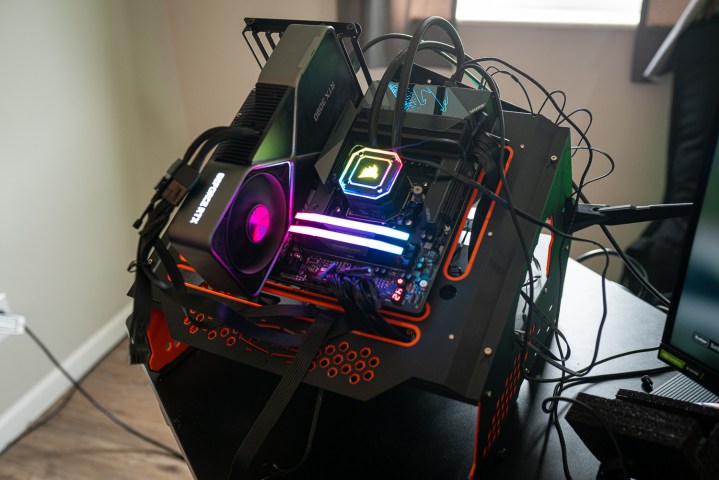
This is an interesting generation for AMD, as it sees the introduction of DDR5 memory to AMD’s processors. Intel has supported DDR5 for almost a year, but now that AMD has made the jump, DDR4 is all but dead. Still, I kept my test benches as close as possible, just swapping out 32GB of DDR4-3200 for 32GB of DDR5-6000 (the sweet spot for Ryzen 7000, according to AMD).
| AMD Zen 4 | Intel 12th-gen | AMD Zen 3 | Intel 10th-gen | |
| CPU | AMD Ryzen 9 7950X | Intel Core i9-12900K | AMD Ryzen 9 5950X | Intel Core i9-10900K |
| GPU | Nvidia RTX 3090 Founders Edition | Nvidia RTX 3090 Founders Edition | Nvidia RTX 3090 Founders Edition | Nvidia RTX 3090 Founders Edition |
| RAM | 32GB Corsair Vengeance DDR5-6000 | 32GB Corsair Vengeance DDR5-6000 | 32GB Corsair Vengeance LPX DDR4-3200 | 32GB Corsair Vengeance LPX DDR4-3200 |
| Motherboard | Gigabyte X670E Aorus Master | MSI Pro Z690-A DDR4 | Gigabyte Aorus B550 Elite | Asus Tuf Gaming Z490-Plus |
| CPU cooler | Corsair H150i Elite Capellix | Corsair H150i Elite Capellix | Corsair H150i Elite Capellix | Corsair H115i Elite Capellix |
| Power supply | Gigabyte Aorus P1200W | Gigabyte Aorus P1200W | Gigabyte Aorus P1200W | EVGA G6 1000W 80 Plus Gold |
| Storage | Corsair MP400 1TB SSD | Corsair MP400 1TB SSD | Corsair MP400 1TB SSD | Crucial MX500 2TB SSD |
In addition to the processors above, I also tested AMD’s Ryzen 7 5800X3D in gaming. In fairness, that chip really isn’t competing with the Ryzen 9 7950X, but it’s an important processor to include for gaming benchmarks. I just swapped the CPU on my Zen 3 test bench for that processor.
Unlike all previous Ryzen processors, the Ryzen 7000 CPUs use the new AM5 socket, so you’ll need a motherboard upgrade. Currently, we just have X670 and X670E motherboards, but AMD will release B650 options in October. Make sure to reference our writeup on AM5 and X670 if you want to know which chipset is right for you.
Performance
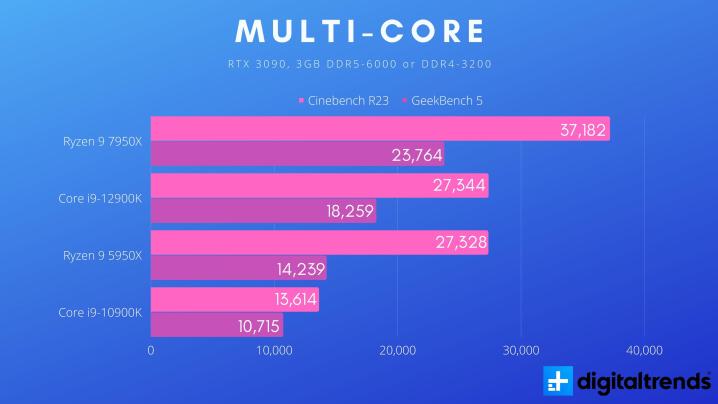
If you had any doubts about the power of the Ryzen 9 7950X, you can put them to rest. Across the board, it posted the highest results out of any CPU I’ve tested, and sometimes by a significant margin. That’s best evidenced by Geekbench 5 and Cinebench R23, where the Ryzen 9 7950X beat out the multi-core performance of the Core i9-12900K by 30% and 36%, respectively.
Single-core improvements aren’t as large, with a 1% boost in Cinebench and a 6% jump in Geekbench. However, the generational improvements are massive here. AMD managed a 31% increase over the Ryzen 9 5950X in Cinebench R23 and a 25% increase in Geekbench 5. When AMD said it would offer a 29% increase in single-core performance over Ryzen 5000, it was telling the truth.
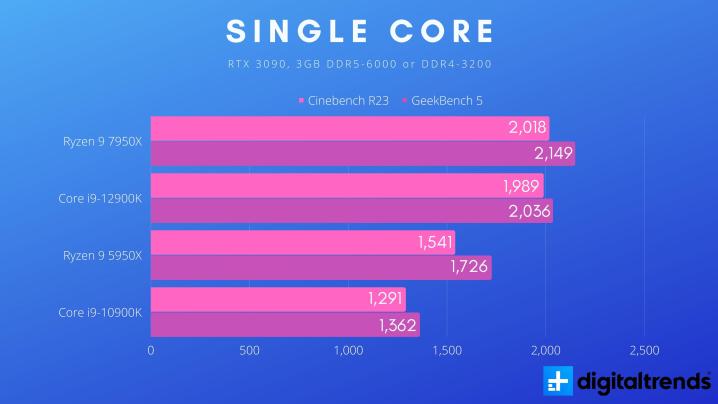
Real applications don’t always see such a large increase, but some even push beyond what Geekbench and Cinebench suggest. In 7-zip, for example, you’re looking at almost a 60% increase in performance over the Ryzen 9 5950X and a massive 76% jump over the Core i9-12900K, flexing AMD’s muscle with 16 full, fat cores.

Creative apps also saw a boost, with the Ryzen 9 7950X shaving off 34% of encoding time in Handbrake compared to the previous generation and 19% compared to the Core i9-12900K. Even the overclocked Core i9-12900KS is behind the Ryzen 9 7950X — a chip that Intel released in April for $800.
| Ryzen 9 7950X | AMD Ryzen 9 5950X | Intel Core i9-12900K | Intel Core i9-10900K | |
| Cinebench R23 (single/multi) | 2,018 / 37,182 | 1,541 / 27,328 | 1,989 / 27,344 | 1,291 / 13,614 |
| Geekbench 5 (single/multi) | 2,149 / 23,764 | 1,726 / 14,239 | 2,036 / 18,259 | 1,362 / 10,715 |
| Handbrake (seconds, lower is better) | 38 seconds | 58 seconds | 47 seconds | 72 seconds |
| 7-Zip | 222,209 MIPS | 139,074 MIPS | 126,215 MIPS | 86,172 MIPS |
| PugetBench for Premiere Pro | 1,172 | 992 | 1,066 | 855 |
| PugetBench for Photoshop | 1,498 | 1,009 | 1,315 | 1,023 |
The CPU market is always a balance of AMD and Intel leapfrogging each other, but AMD is showing with the Ryzen 9 7950X that it’s leading that performance charge. It’s not without competition, though. Intel is set to release its 13th-gen Raptor Lake processors in short order, which will likely bring the performance scales closer to balanced.
Gaming

Going into this review, I was skeptical that the Ryzen 9 7950X could beat out AMD’s last-gen Ryzen 7 5800X3D. It was the fastest gaming CPU by a decent margin, and without 3D V-Cache at the helm, I assumed the Ryzen 9 7950X would be a disappointment in games. That’s not the case, but AMD’s 3D-stacked part still holds up remarkably well.
Before digging into the results, I ran all of my tests at 1080p with the highest graphics preset available. All of my results are from the test bench configurations you can find above, short of Halo Infinite, which was run with an RTX 3070 but the same configurations otherwise.
Gen-on-gen, I measured a 13.4% increase with the Ryzen 9 7950X over the Ryzen 9 5950X. We have an increase in clock speed on the Zen 4 part, but the same 16 cores and only 8MB extra of CPU cache. That’s an increase purely from process and architecture, which is quite the feat. However, it’s not quite as high as the generational improvement Ryzen 5000 provided, which landed somewhere between 15% and 20%. Interestingly, the 13% increase is the same number AMD cited for its instructions per clock (IPC) gains, illustrating how important this metric is for gaming.
| Ryzen 9 7950X | AMD Ryzen 7 5800X3D | Intel Core i9-12900K | AMD Ryzen 9 5950X | |
| 3D Mark Time Spy | 19,113 | 17,078 | 19,396 | 17,922 |
| 3D Mark Fire Strike | 43,386 | 37,380 | 39,870 | 38,911 |
| Red Dead Redemption 2 | 140 fps | 119 fps | 137 fps | 133 fps |
| Assassin’s Creed Valhalla | 115 fps | 111 fps | 107 fps | 110 fps |
| Forza Horizon 4 | 257 fps | 214 fps | 234 fps | 201 fps |
| Halo Infinite | 134 fps | 127 fps | 113 fps | 119 fps |
| Cyberpunk 2077 | 128 fps | 128 fps | 122 fps | 127 fps |
| Far Cry 6 | 153 fps | 147 fps | 141 fps | 115 fps |
| Civilization VI (turn time, lower is better) | 6.1 seconds | 6.6 seconds | 7.3 seconds | 7.5 seconds |
You’re looking at about 13% overall, but some games see a much higher uplift. In Forza Horizon 4, I measured nearly a 28% increase, for example, and Far Cry 6 resulted in a 33% increase. On the other end, GPU-limited games like Cyberpunk 2077 and Red Dead Redemption 2 showed minimal differences, which will completely disappear as you increase your resolution.
Compared to the Ryzen 7 5800X3D, the differences are smaller — just under 9% across the games I tested. That said, the 3D-stacked chip is being brought up by games that benefit from its additional cache. In Red Dead Redemption 2, for example, the Ryzen 9 7950X was nearly 18% faster than the Ryzen 7 5800X3D.
AMD is providing a sizeable boost in performance over current-gen flagships.
Intel’s flagship Core i9-12900K is a bit tighter, with the Ryzen 9 7950X outpacing it by 8% overall. However, the Core i9-12900K is much closer than the Ryzen 7 5800X3D in multiple titles, mainly being brought down by Halo Infinite and Forza Horizon 4 — both games that traditionally see higher performance with AMD parts.
Although the generational improvement isn’t as stark, it’s still close. And AMD is still providing a sizable boost in performance over current-gen flagships. My only hesitation recommending the Ryzen 9 7950X to gamers is that we know 3D V-Cache versions are on the way. Depending on when those launch, we very well could be in a situation where something like a Ryzen 7 7700X3D could beat the Ryzen 9 7950X in gaming for less money.
Integrated graphics
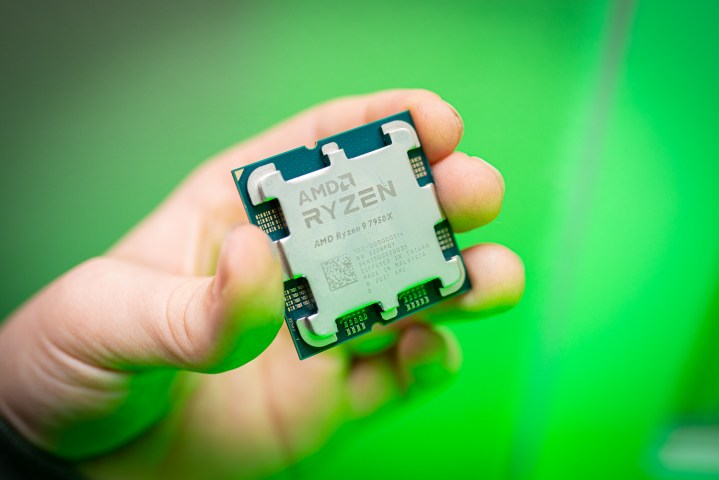
AMD lied, and thank goodness for that. Each Ryzen 7000 CPU comes with two RDNA 2 graphics cores, which AMD said were for troubleshooting, not gaming. And although the integrated GPU isn’t great for gaming, it still works. It’s more than capable of running esports titles above 60 fps, even at 1080p with respectable graphics settings.
| Ryzen 9 7950X | |
| Forza Horizon 4 (1080p, Medium) | 33 fps |
| Rocket League (1080p, Performance) | 99 fps |
| Rainbow Six Siege (1080p, Medium) | 47 fps |
You could very reasonably play games like Rocket League just on the integrated graphics and have a great experience. Forza Horizon 4 stood out a lot, too. I was locked above 30 fps in the game, putting the integrated GPU somewhere above a base Xbox One. You wouldn’t want to game on the iGPU full time, but it works damn well as a stop-gap for a discrete GPU or to run lightweight games at lower resolutions.
The gaming prowess is impressive, but the integrated graphics made a massive difference outside of gaming during my review. This is the first generation of Ryzen CPUs where AMD has included graphics on the chip, which is very helpful for diagnosing a PC. I had to use them initially to get my test bench set up, actually. Conflicting GPU drivers meant I didn’t see anything in Windows, but I was able to use the iGPU to uninstall the drivers and get everything set up properly. This would take a clean install of Windows on previous Ryzen CPUs.
They come with video encode and decode capabilities, as well, though GPU acceleration in these tasks is the ideal way to go.
Power and thermals

The Ryzen 9 7950X may have 16 cores like the Ryzen 9 5950X, but it draws a lot more power. 170W is the technical limit, but it can boost up to 230W for brief periods under load. That’s on the level of the Core i9-12900K, which is the most power-hungry processor currently on the market. In a multi-core run on Cinebench R23, the processor immediately went up to 95 degrees Celsius (its thermal limit) and hovered around 5GHz to 5.1GHz.
It’s a bit concerning, but AMD says this totally expected. The Ryzen 9 7950X will hit a thermal wall before it hits a power wall, and the processor is designed to hit that thermal limit in intense multi-core workloads like Cinebench. AMD says you could run the processor 24/7 at this temperature without any risks of damaging or decreasing performance.
My results came from using the Ryzen 9 7950X with a 360mm all-in-one liquid cooler. That’s one of the pros of the Ryzen 9 7950X — it works with the vast majority of AM4 coolers, including the AIO I used. Although the operating temperature is safe and expected, the processor still gets hot under load and causes your CPU fans to ramp up. But true to AMD’s claims, I topped out at 201W for the total platform, and about 160W for the CPU alone, even with the 95-degree ceiling. Even when bumping against that wall, I was able to push a moderate overclock, as well.
Overclocking
Overclocking with Precision Boost Overdrive (PBO) lends some validity to AMD’s claims about the thermal wall. I still hit 95 degrees, but PBO with a 10X scaler pulled off a 200MHz bump, allowing me to just barely miss 6GHz on a single core. The processor went up to 185W, too, showing that although there’s a thermal limit, there’s still plenty of headroom for power.
| Ryzen 9 7950X | Ryzen 9 7950X PBO +200MHz | |
| Cinebench R23 (single/multi) | 2,018 / 37,182 | 2,036 / 37,596 |
| Geekbench 5 (single/multi) | 2,149 / 23,764 | 2,214 / 24,039 |
| Handbrake (seconds, lower is better) | 38 seconds | 35 seconds |
| 7-Zip | 222,209 MIPS | 225,647 |
| Far Cry 6 | 153 fps | 158 fps |
| Forza Horizon 4 | 257 fps | 260 fps |
Across all cores, I topped out at 5.2GHz in my Cinebench R23 run, resulting in a very modest 1% uptick in my multi-core score. Real applications saw a larger benefit, with a 3% bump in Far Cry 6 and nearly an 8% drop in encoding time in Handbrake. Even with a modest overclock, you can squeeze some extra performance out of the Ryzen 9 7950X.
If you go to the extreme end, the gains will likely be much higher. AMD has already shared some LN2 overclocking demos, showcasing the Ryzen 9 7950X reaching over 6.8GHz on a single core. There’s some headroom here for overclocking, given you have enough power and cooling.
However, the vast majority of people won’t be using LN2 to overclock, and in that case, PBO is the best option. Although you may be able to squeeze out a bit of extra performance with tuning, PBO is still providing a decent uplift.
Should you buy the Ryzen 9 7950X?
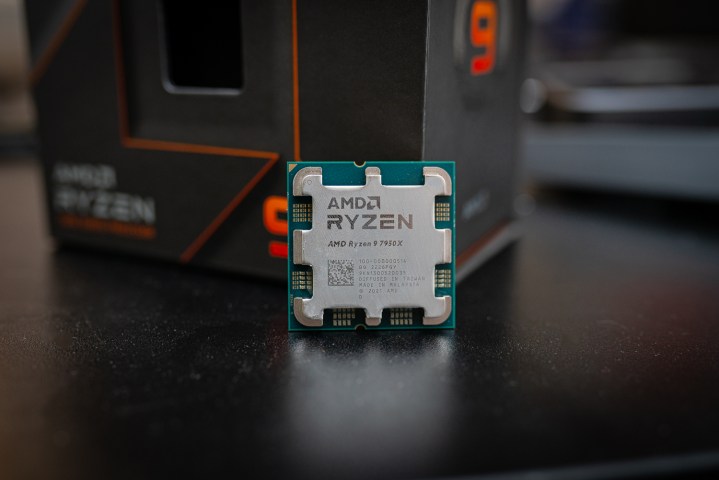
If you’re looking for the best performance you can get out of a CPU today, the Ryzen 9 7950X is for you. It’s not only the fastest, it’s the fastest by a solid margin. The gen-on-gen improvements are even more impressive, especially considering that AMD is offering the Ryzen 9 7950X at $100 less than the Ryzen 9 5950X at launch.
The Core i9-12900K is $100 cheaper, but it’s a decent bit behind in overall CPU performance. It’s important to note that Intel’s 13th-gen flagship is on the way, which will shift the price/performance balance. But today, the Ryzen 9 7950X is the fastest CPU you can buy.
Gamers have a tough decision, though. The Ryzen 9 7950X is overkill, so a cheaper option in the lineup is the way to go. If you’re patient, waiting for 3D V-Cache chips is the best option. The Ryzen 7 5800X3D is still very close in gaming, despite using a last-gen architecture and costing half as much, so 3D-stacked Ryzen 7000 parts should provide the best gaming performance once they’re here.






